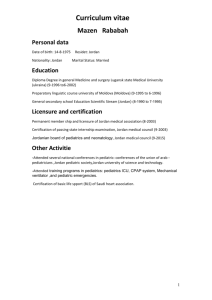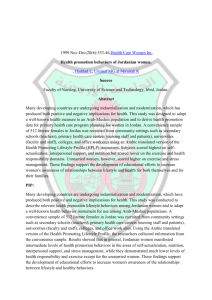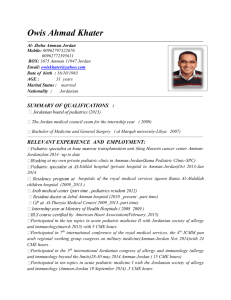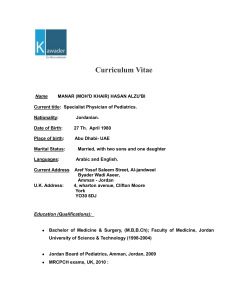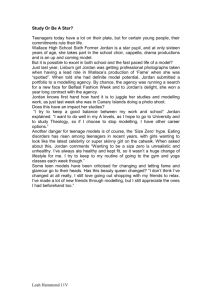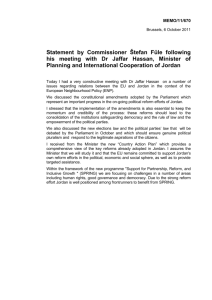ongoing plight of Gazans in Jordan by Oroub el Abed
advertisement
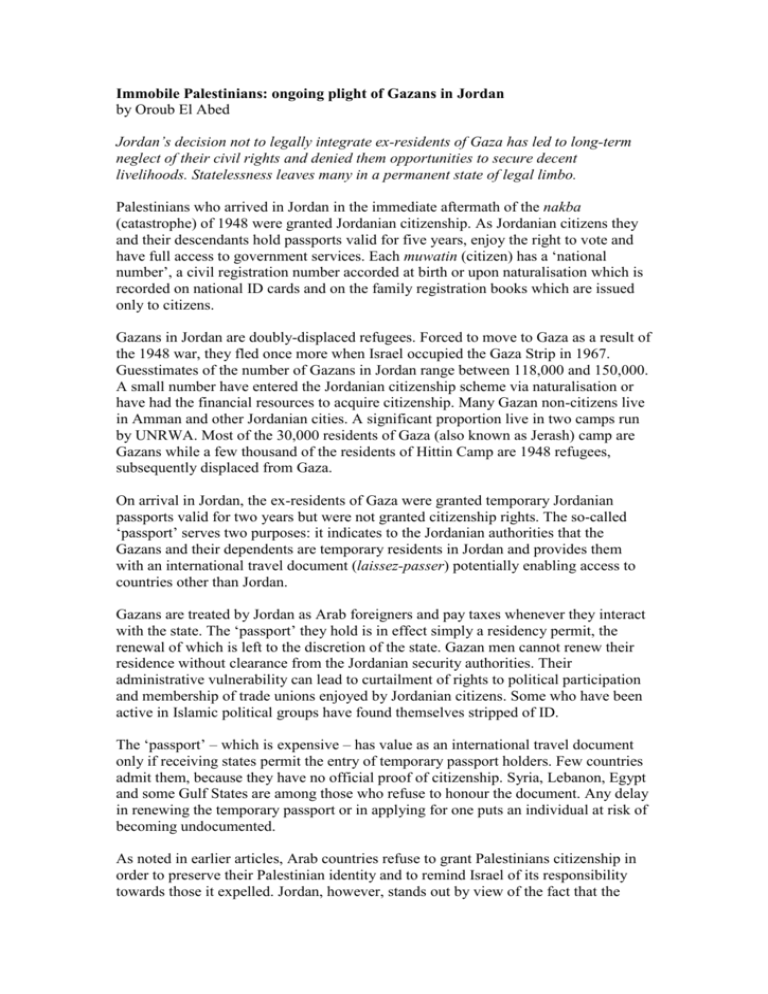
Immobile Palestinians: ongoing plight of Gazans in Jordan by Oroub El Abed Jordan’s decision not to legally integrate ex-residents of Gaza has led to long-term neglect of their civil rights and denied them opportunities to secure decent livelihoods. Statelessness leaves many in a permanent state of legal limbo. Palestinians who arrived in Jordan in the immediate aftermath of the nakba (catastrophe) of 1948 were granted Jordanian citizenship. As Jordanian citizens they and their descendants hold passports valid for five years, enjoy the right to vote and have full access to government services. Each muwatin (citizen) has a ‘national number’, a civil registration number accorded at birth or upon naturalisation which is recorded on national ID cards and on the family registration books which are issued only to citizens. Gazans in Jordan are doubly-displaced refugees. Forced to move to Gaza as a result of the 1948 war, they fled once more when Israel occupied the Gaza Strip in 1967. Guesstimates of the number of Gazans in Jordan range between 118,000 and 150,000. A small number have entered the Jordanian citizenship scheme via naturalisation or have had the financial resources to acquire citizenship. Many Gazan non-citizens live in Amman and other Jordanian cities. A significant proportion live in two camps run by UNRWA. Most of the 30,000 residents of Gaza (also known as Jerash) camp are Gazans while a few thousand of the residents of Hittin Camp are 1948 refugees, subsequently displaced from Gaza. On arrival in Jordan, the ex-residents of Gaza were granted temporary Jordanian passports valid for two years but were not granted citizenship rights. The so-called ‘passport’ serves two purposes: it indicates to the Jordanian authorities that the Gazans and their dependents are temporary residents in Jordan and provides them with an international travel document (laissez-passer) potentially enabling access to countries other than Jordan. Gazans are treated by Jordan as Arab foreigners and pay taxes whenever they interact with the state. The ‘passport’ they hold is in effect simply a residency permit, the renewal of which is left to the discretion of the state. Gazan men cannot renew their residence without clearance from the Jordanian security authorities. Their administrative vulnerability can lead to curtailment of rights to political participation and membership of trade unions enjoyed by Jordanian citizens. Some who have been active in Islamic political groups have found themselves stripped of ID. The ‘passport’ – which is expensive – has value as an international travel document only if receiving states permit the entry of temporary passport holders. Few countries admit them, because they have no official proof of citizenship. Syria, Lebanon, Egypt and some Gulf States are among those who refuse to honour the document. Any delay in renewing the temporary passport or in applying for one puts an individual at risk of becoming undocumented. As noted in earlier articles, Arab countries refuse to grant Palestinians citizenship in order to preserve their Palestinian identity and to remind Israel of its responsibility towards those it expelled. Jordan, however, stands out by view of the fact that the majority of Palestinians living within the borders of the Hashemite Kingdom of Jordan were granted fully-fledged citizenship when Jordan formally annexed the West Bank in 1950. The Gazans, perceived and labelled by law and administrative practice as Palestinians, are therefore an anomaly. UNRWA provides Gazan refugees with relief, health and education services but cannot meet all their needs. Since 1986 it has been harder for Gazans to compete for places in Jordanian universities as they must secure places within the 5% quota reserved for Arab foreigners. Entry to professions is blocked as Gazans are not allowed to register with professional societies/unions or to establish their own offices, firms or clinics. Only those with security clearance can gain private sector employment. Those who work in the informal sector are vulnerable to being exploited. Many Gazans are keen to leave Jordan to seek employment elsewhere but are constrained from doing so. Some have attempted to leave clandestinely. Press articles indicated in 2005 that the Arab League and the Palestinian Authority have explored the possibility of facilitating the return of Gazans to their first place of exile, the Gaza Strip. However, with Gaza besieged and attacked by Israel and in the grip of a worsening humanitarian crisis, this is not a viable option [Box] Rami was brought up in Jordan, studied law and worked for over two years for a law firm in the West Bank city of Hebron. Lacking a West Bank Israeli-issued ID, he was forced to return to Jordan every three months to renew his visitor’s visa. Due to the high cost of living he returned to Jordan in 1999 only to find himself stripped of his Jordanian temporary passport. Now without any form of identity, he notes that “being Gazan in Jordan is like being guilty.” [End box] In Jordan, as in most other Middle-Eastern countries, women cannot pass on their citizenship to their children. Neither is citizenship granted to a child born on the territory of a state from a foreign father. Married women are forced to depend on their fathers or husbands to process documents related to their children. Because of this patriarchal conception of citizenship, children of Jordanian women married to Gazans are at risk of being left without a legal existence. [Box] Heba, a Jordanian national, married Ahmad, a Gazan with an Egyptian travel document. A year after their marriage, Ahmad was arrested for being in Jordan without a residence permit. Deported from Jordan, he was refused re-entry to Egypt and ended up in Sudan. Heba had a child but has been unable to register the birth due to the absence of her husband. She cannot afford to go to Sudan to be with him. [End box] Over half a century has passed since a British colonial officer noted that he could not “see that there is any hope of finding a suitable home for the unfortunate Gaza refugees”.1 Resolutions of the UN, protocols of the Arab League and expressions of concern from the international community have led to nothing. Until such time as a Palestinian state is established, stateless Gazans should not be forced to live in limbo, left outside conventions which should ensure their human and civil rights. Oroub El Abed is an Amman-based independent researcher working on Middle East refugee issues. Email: oroub@go.com.jo 1 Public Records Office, Foreign Office, Correspondence No 119/3/9, from T C Rapp of the British Middle east Office to J Creswell, British Embassy, Cairo, 1952.

